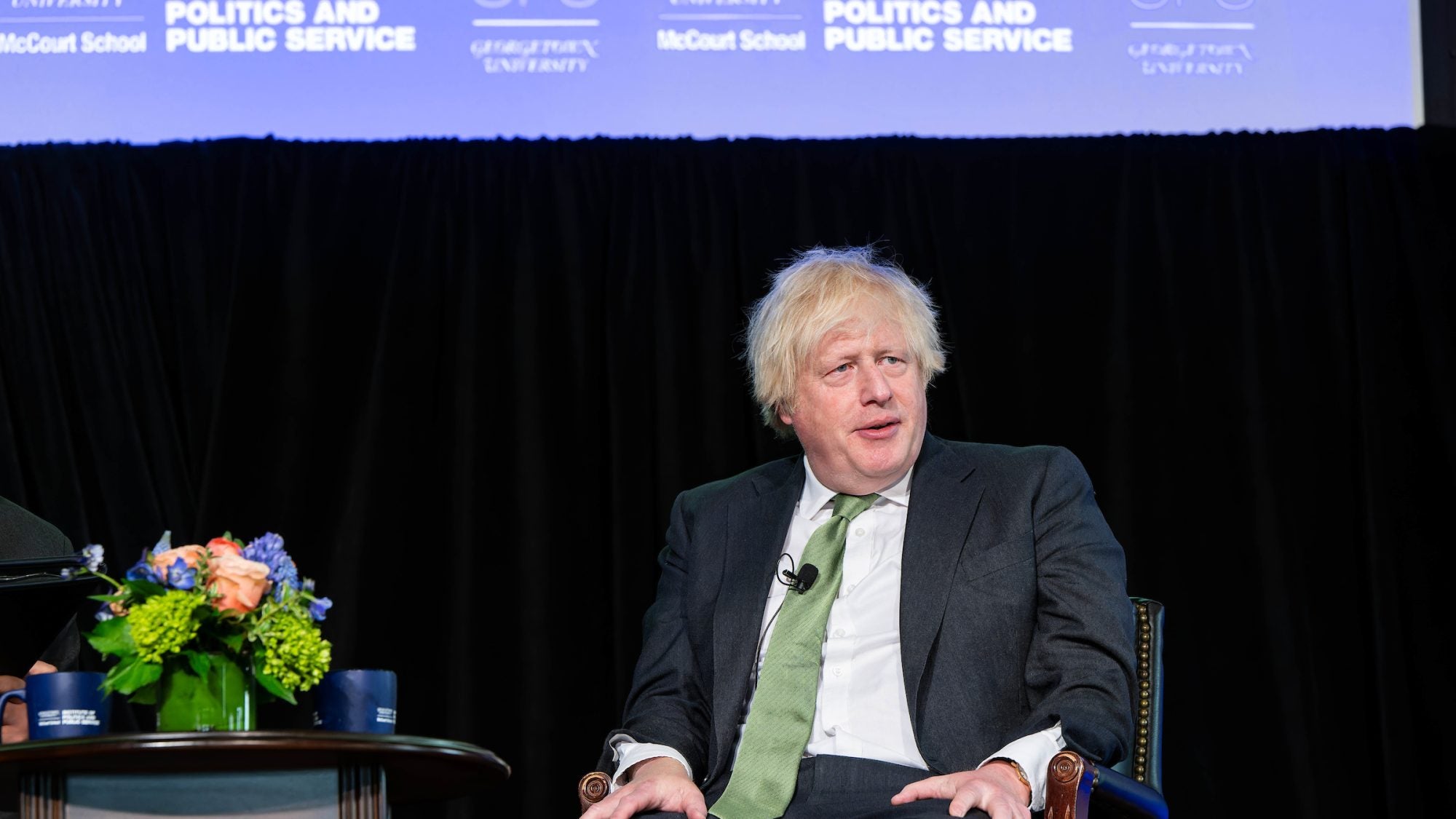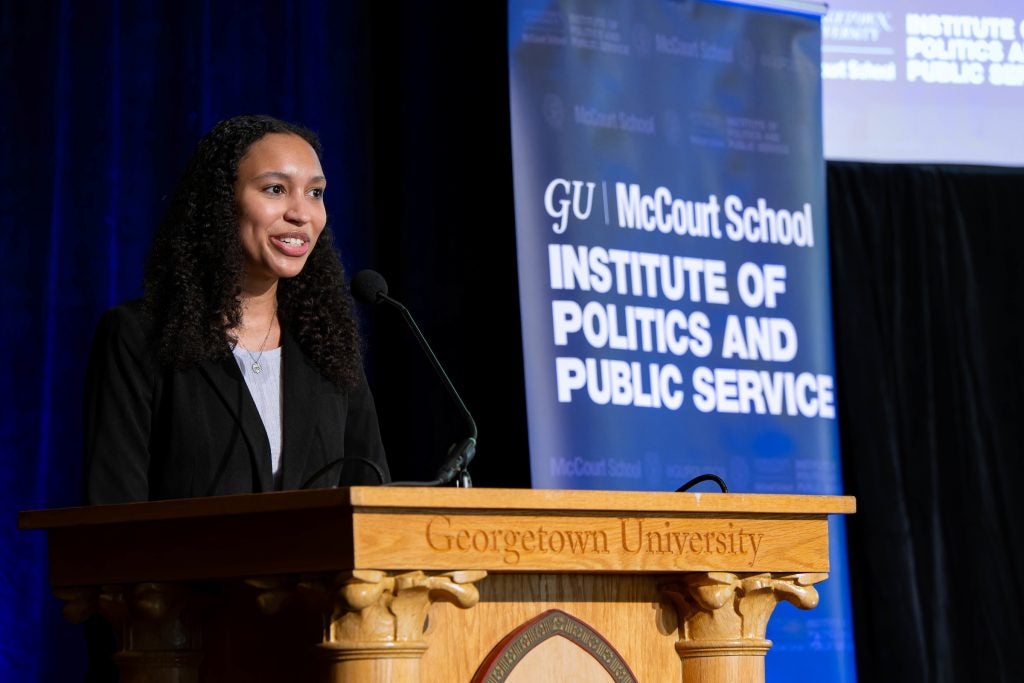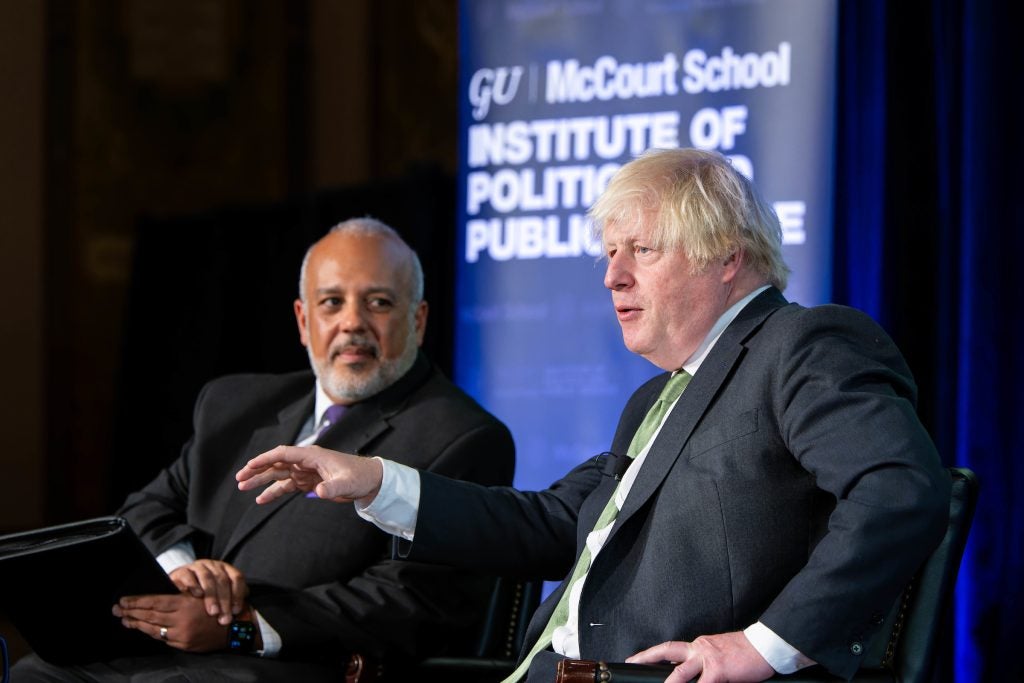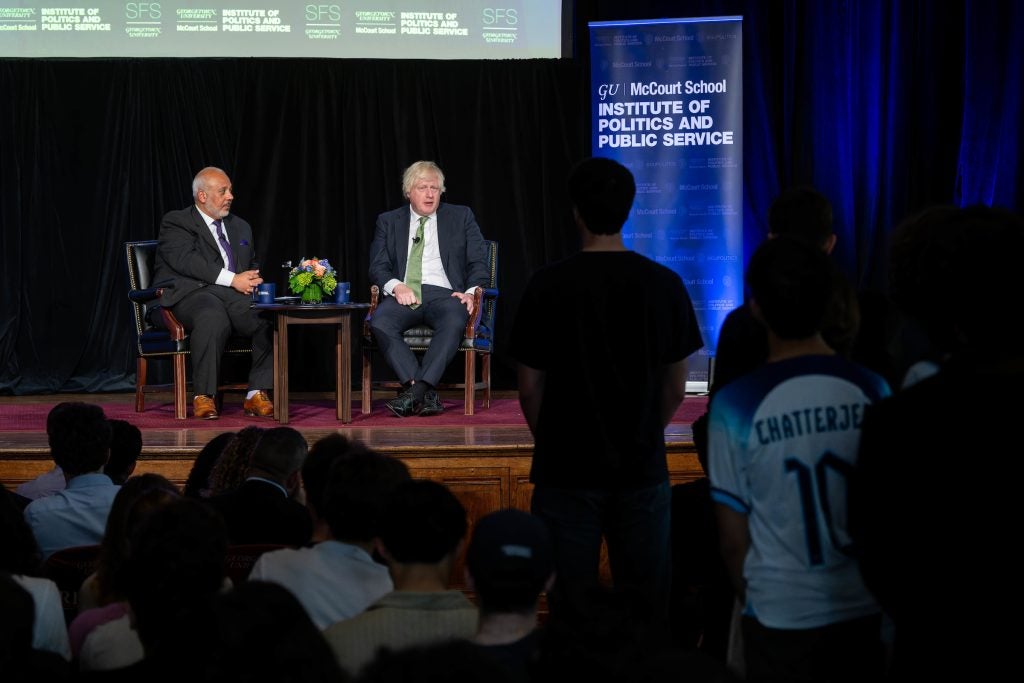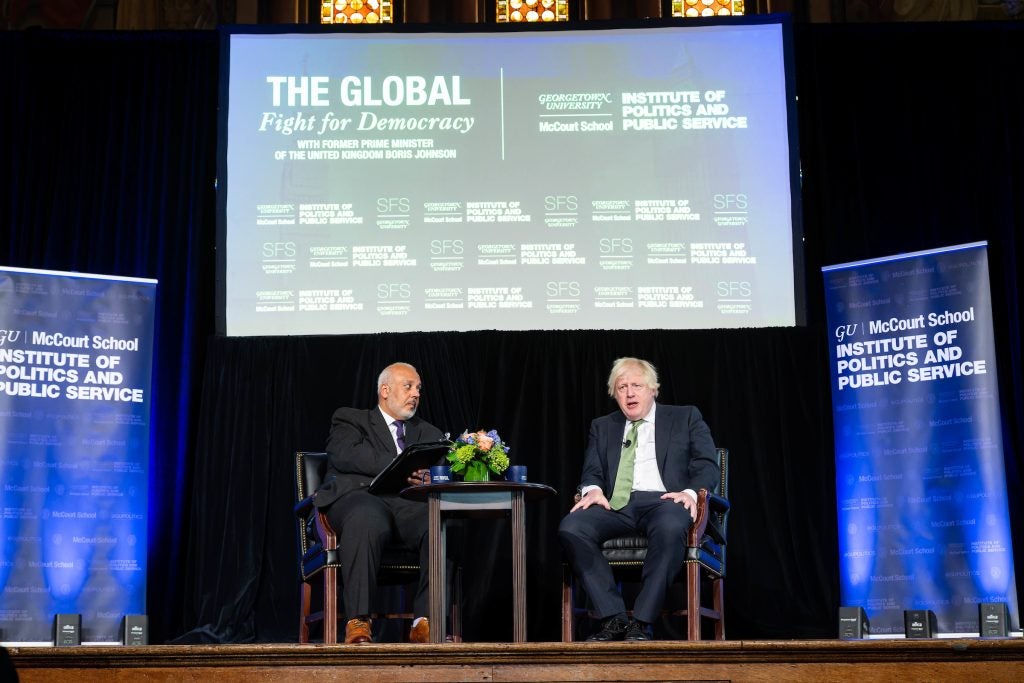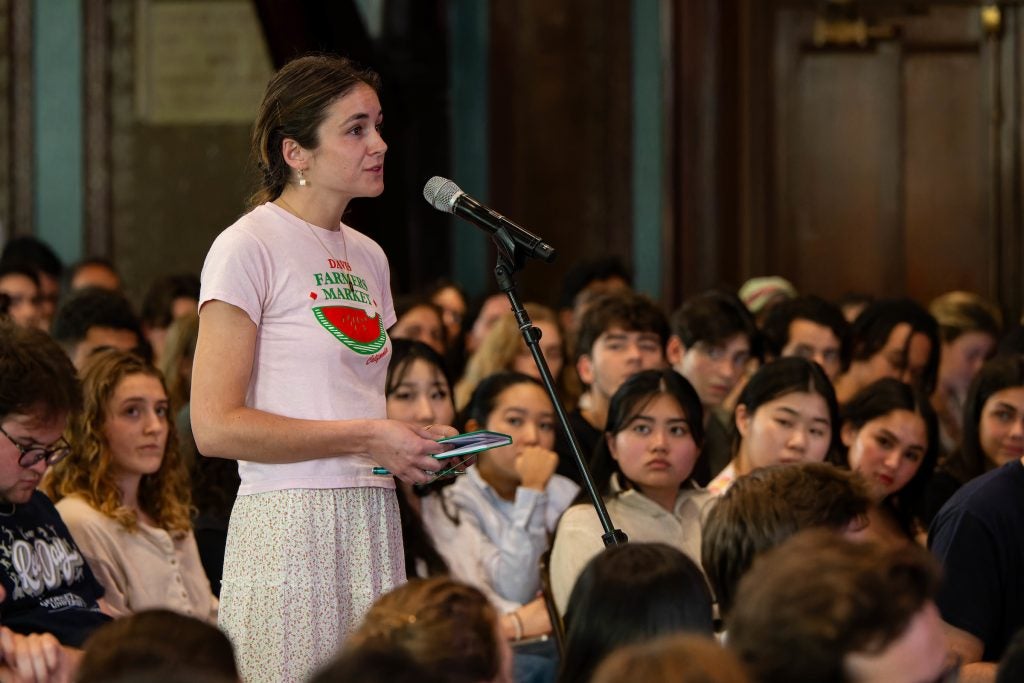On Thursday April, 11 Georgetown students filled Gaston Hall to hear former Prime Minister of the United Kingdom Boris Johnson have a conversation about global politics and democracy with GU Politics Executive Director Mo Elleithee.
Christianna Doele (SFS’24), a student associate for GU Politics, introduced the event. She emphasized the importance of engaging in conversations about global affairs and offered a background on Johnson’s political history.
Elleithee started the conversation by asking Johnson for a broad global assessment on the state of democracy in the world.
“Make the case for democracy. And how strong is it?” Elleithee asked.
“I think with democracy we kind of assume that everybody agrees with us and everyone’s in favor of democracy,” Johnson said. “We don’t really interrogate ourselves about why democracy is better and why we champion it so fervently.”
Johnson emphasized that democracy is morally right and that democratic systems produce greater prosperity and stability. He expressed concern that the absence of democracy leads to corruption, lack of innovation and arbitrary use of power.
“Democracy is under threat and democracy is in retreat in places,” Johnson said. “Nowhere more clearly than in Ukraine, and we need to be fighting for it.”
Elleithee followed by asking Johnson how well the West is handling the situation in Ukraine.
“I think the answer is we’ve handled it too slowly,” Johnson said.
Johnson also indicated the importance of Western support in Ukraine’s success and emphasized the impact of U.S. support.
“Without the sheer weight of American support,” Johnson said, “it might have been very different… there could be no more effective way of investing in Western security than investing in Ukraine,” Johnson said.
Elleithee asked Johnson about the conflict in Israel and Gaza. “What is your take on the situation there now and the best way to proceed?” Elleithee asked.
“The primary duty of a government is to protect its people. And that is – I’m afraid – why Israel has had to do what it has had to do,” Johnson said. “I wish it would end, but I cannot see an easy solution and I certainly cannot countenance a solution in which we drop our basic support for the only democracy in the region and allow Hamas to win.”
“I wholly oppose an arms embargo on Israel,” Johnson added.
Elleithee asked Johnson whether there should be pressure on Israel given the “innocent Palestinian civilians who are caught in this.”
“Look, I think that some of the things that have happened have been utterly reprehensible,” Johnson said. “But, as far as I can tell, there is a huge amount of pressure on Israel to try to minimize civilian casualties,” Johnson said. “Whereas with Hamas, the motive is the other way around.”
Elleithee then cited increased support from U.S. and U.K. citizens for more autocratic leadership and asked Johnson about his concern regarding the shift away from democratic values.
“I’m making a case for democracy – I’m not saying democracy is perfect,” Johnson said in response.
Johnson also took the opportunity to defend Brexit. “The people of the United Kingdom didn’t want to be endlessly locked into something which was trying to create a single political entity and eroding their democratic freedoms,” he said.
Johnson cited U.S. economic growth and innovation as evidence for rejecting European Union regulations. He argued that the U.K.’s success with administering Covid-19 vaccines was in part due to the country’s independence from the E.U.
“Democracy – the ability to run your own country – is absolutely fundamental,” Johnson said, “And that is also what Brexit is about.”
Students then had the opportunity to ask Johnson questions.
Evan Cornell (C ‘27) asked about the former Prime Minister’s perspective on parliamentary versus presidential systems of government.
“Do you believe that a parliamentary system is a more democratic institution than a presidential system?” he asked.
Johnson recounted his time in Parliament and the strength of the system in holding leaders like himself accountable to the people he served.
“I think the parliamentary system is pretty good. But I wouldn’t cast any aspersions on this great system you also have,” Johnson said. “Which, I actually think – in spite of everything – is in pretty robust, good health.”
Shane Ward (SSP ‘25) challenged Johnson to confront times that he undermined democracy for British people, noting his efforts “to pass the Brexit bill without proper scrutiny.” Ward asked Johnson, “Do you believe honesty and integrity on behalf of elected officials are vital parts of democracy in the West?”
Johnson defended the actions he took in office, particularly with his efforts on Brexit. “The British public were getting the increasing impression that their view, which they’d expressed – that they wanted to leave the European Union – was not going to be honored by the politicians.”
“That was the dishonesty…” Johnson said, “That their will was being thwarted.”
McCourt School of Public Policy student Talia Stringfellow (MPP ‘25) asked Johnson, “What are your thoughts on the risk of our democracy in the U.S. if Donald Trump gets elected in November?”
“January 6th? I thought that was terrible,” Johnson said. “He should have respected the will of the people … the voters had gone against him. And that is very, very important in a democracy…With the exception of [January 6th] – which is a serious problem…I’m not starry-eyed about this. But I’m hopeful.”
Another student asked, “Do you think that a democratic procedure like the Brexit referendum is truly democratic if voters are only offered two choices without adequate information about the consequences?”
Johnson defended the policy, “In the Brexit campaign, the issues were exhaustively debated.”
Johnson also answered questions about the fate of Scottish independence, the ethics of the British Museum and the challenges of innovation in autocracies like China.
Elleithee concluded by asking Johnson, “What are the chances you, yourself will stand for election again?”
“Unlikely in the short term,” Johnson said. “But, the only circumstances under which anybody should stand for election is if they really think they have something useful to contribute… If I did think that, then I would,” Johnson said.
This article was written by Jane Wright (MPP ’25), a first-year student in the McCourt School of Public Policy.
Watch the full recording of the event below.
